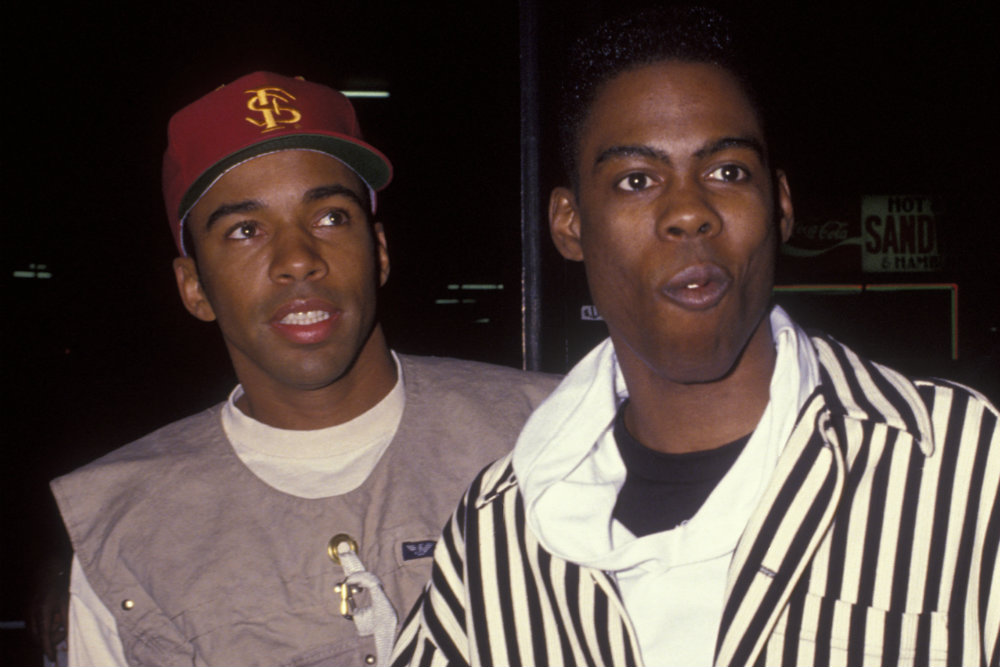This story originally appeared in the February 1993 issue of Spin, which was partially written and guest-edited by members of the SNL cast. Read interviews and stories from comedy icons of the era–Lorne Michaels, Adam Sandler, Tim Meadows, Julia Sweeney and others–in our package of highlighted stories from the issue.
Chris Rock offers up a weary shrug when pressed for a reaction to the now-notorious In Living Color skit that made sport of his selective Saturday Night Live appearances. “Me not being on is not a conspiracy,” he says, shuddering at the memory of Marlon Wayans’s buck-toothed parody in which Rock fails to make it past the security guard on his own show.
A staunch defender of the series, he nonetheless admits to feelings of restriction: “I do a militant and a homeboy, things any white people can get.” While his ambitions to parody Donnie Simpson and execute a mock Jacksons biopic on the Sylvers (An American Nightmare) will probably go unrealized, he’s able to compensate via an increasingly rewarding big-screen career.
This spring’s CB4 finds Rock, who also had a hand in penning and producing the movie, tweaking the image of gangsta rap. He essays the role of a middle-class Milquetoast and failed rapper who pilfers the identity of a neighborhood thug when said no-goodnik ends up behind bars. Taking the gangsta route to success, he and his group CB4 (also including fellow New Jack City alum Allen Payne and Cool As Ice survivor Deezer D), get girls, get paid, and get mad props from the likes of Eazy-E and Ice-T.
Naturally, the real villain learns of this charade and vows to sign his impostor’s death certificate. “All the rap stuff is there,” says Rock. “You got the female reporters: ‘Why do you call women bitches and hos?‘ Phil Hartman plays this politician who’s trying to outlaw the group. You got one scene where a bunch of dancers — girls from videos — are talking, and one says, ‘You know my left tit was prominently featured in Eric B’s last video.’ I think it’s the first good rap movie.”
Maybe that’s not such a lofty achievement considering the wretched past of the genre. “A lot of these films were made by people who didn’t like rap,” notes Rock. “They thought it was some fad — ‘Let’s make a movie real quick before this shit’s over.’ They would have anyone in the movie rapping. They would have janitors and mailmen rapping: ‘I’m the mailman / I’m here to say / I’m here to open your mail / and have a nice day.’ ”
The movie, which Rock worked on with the ever-erudite Nelson George, has at its core a “be yourself, don’t try to be hard if you’re not hard” message, but Rock intends no censure on rap imagery, however brutal. “Some guys really live that way. I mean, half of it is wrestling, but there’s a lot of craziness out there. Drive-bys, drugs — that’s all real. I love gangsta rap — it’s so black. Rappers are the closest thing to being actual free black people. Most black people have a job where they have to answer to white people in some way. Everything I write has to go through this white system, and it has even affected my writing somewhat because I know white people are going to judge it. But rappers — it’s not that they hate white people — they don’t care. When Garth Brooks makes an album, no one goes, ‘You sure you can get that black audience?’ No, he doesn’t care. And rappers are the only black people who get to do that in all of society. That’s the coolest job in the world — I can’t imagine living like that.”





